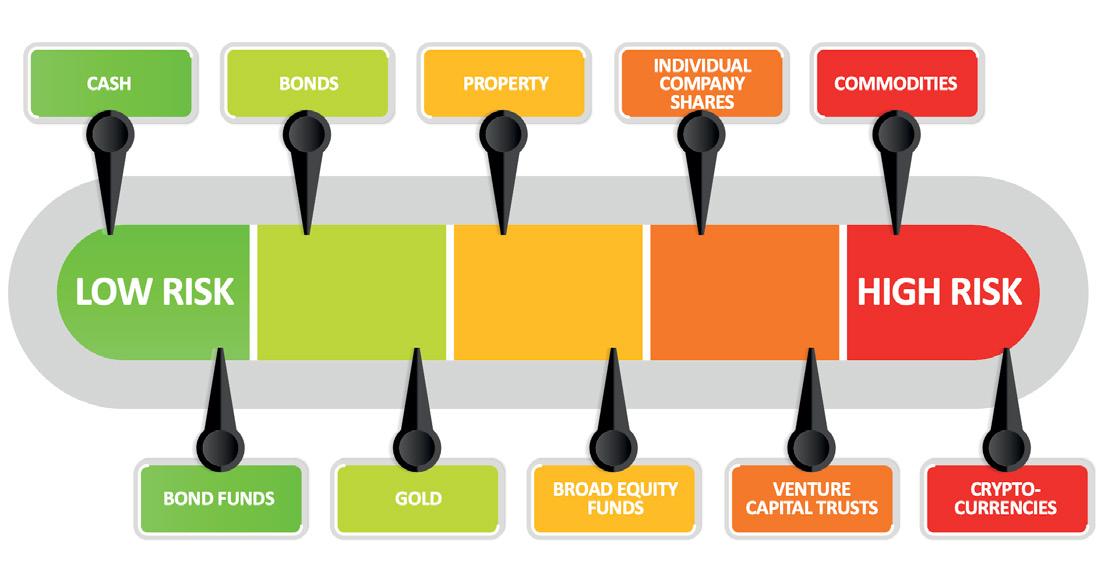
4 minute read
How much money can I make from investing in stocks and bonds?
A football team needs defenders and strikers and a well balanced portfolio needs safer and riskier investments
Investing is never easy but for investors just starting out it can appear particularly intimidating. This article demystifies the process and helps explain risk and return. It will focus on the three broad asset classes of cash, bonds, and shares.
The whole point of investing is to lay out cash today to end up with more cash in the future. This cannot be done without taking some risk along the way. (Cash stashed under the bed doesn’t grow) In other words, risk and return cannot be separated.
Research by Barclays (BARC) based on 122 years of data shows that the odds of stocks beating cash increases from 74% over five years to 91% if stocks are held for 10 consecutive years.
The same can be seen in stocks versus bonds. The message is clear, the longer an investor
Chances of stocks beating cash
Chances of stocks beating bonds
Table: Shares magazine • Source: Barclays Equity Gilt Study 2022. Note: based on data over 118 years for five-year period and 113 years for 10year period. Calculated by dividing the years stocks have outperformed cash by total number of years.
Table: Shares magazine • Source: Barclays Equity Gilt Study 2022. Note: based on data over 118 years for five-year period and 113 years for 10year period. Calculated by dividing the years stocks have outperformed cash by total number of years.
Annualised total returns by asset class since
holds stocks, the better the chances of earning superior returns.
It is useful to think about investment risk as a ‘ladder’. At the bottom of the ladder are relatively safe investments such as cash and government bonds. Safer investments offer lower returns. As investors move up the risk ladder, the potential returns increase.
Cash And Bonds Are Lowerrisk But Offer Lower Returns
Cash earns more today than a year ago as interest rates have risen, but typical instant access cash accounts pay less than 1% per year. Higher cash returns can be achieved by ‘locking’ the cash away for longer.
Cash in the bank is guaranteed by the government up to £85,000. Always consider using tax efficient accounts such as Cash ISAs (individual savings account) or premium bonds.
Bonds are IOUs issued by governments and companies to pay for their spending. Government bonds are considered almost risk free and pay a higher level of interest than cash. Bonds in general carry a fixed rate of interest over a fixed period, say five or 10 years, and pay annual or semiannual ‘coupons’ or interest payments.
Because both these variables are usually fixed, bonds are often described as ‘fixed-income’ securities. Usually, bonds which are due to be repaid longer into the future pay a higher rate of interest than those which mature sooner but their price is also more sensitive to changes in interest rates.
Bonds provide a stable income, but limited growth. Investors can grow their original investment by reinvesting interest payments into new bonds.
It is worth pointing out that although bonds are more stable than shares, they can still lose money, 2022 is a good example with bond prices falling by double-digit percentages reflecting rising interest rates (price moves in the opposite direction to yield).
Individual Shares Are Higher Risk
Shares are further up the risk ladder and are also known as stocks or equities. Unlike cash and bonds shares are held primarily for capital growth and income.
Shares represent exactly what their name suggests – they are a share of a company’s capital (or in other words its cash and assets) and, importantly, they make you a part owner of the business. Think of the capital as a giant pizza and the shares as individual pieces.

Let’s take healthcare company GSK (GSK) as an example. It has divided its capital into 4.1 billion shares. With the shares priced at £14.33 per share, the total market value of the company is approximately £59 billion or £14.33 multiplied by 4.1 billion.
Companies which can expand their business and grow profits over time will usually see their share price increase to reflect the growing value of the business.
It is important to understand that the stock market reflects future expectations and not past or current results. GSK’s market value of £59 billion is what investors believe the company is worth based on future profits.
Companies also pay dividends to shareholders which can be reinvested or taken as income. For investors who do not need the income it is important
Education: Investing for beginners
to reinvest the dividend. The current dividend yield on the FTSE 100 index, representing the 100 largest companies on the UK stock market, is around 3.5%. A dividend yield on an individual share is calculated by dividing the dividend per share by the share price.
Stock picking can be risky and when things go wrong, it can result in significant losses. Share prices move around far more than bond prices. This higher variability in returns is what makes stocks riskier than bonds.
You should not put all your eggs in one basket. It is important to build a balanced portfolio to protect against losses. For beginners it can make sense to invest in shares through an exchange traded fund that tracks a major index such as the FTSE 100 or an actively managed fund while you build your confidence and knowledge.

By Martin Gamble Education Editor
Investing For Beginners
This is the first in a series of articles aimed at demystifying the markets for anyone just starting out with their investing. Look out for the next part of the series in a future issue of Shares.










